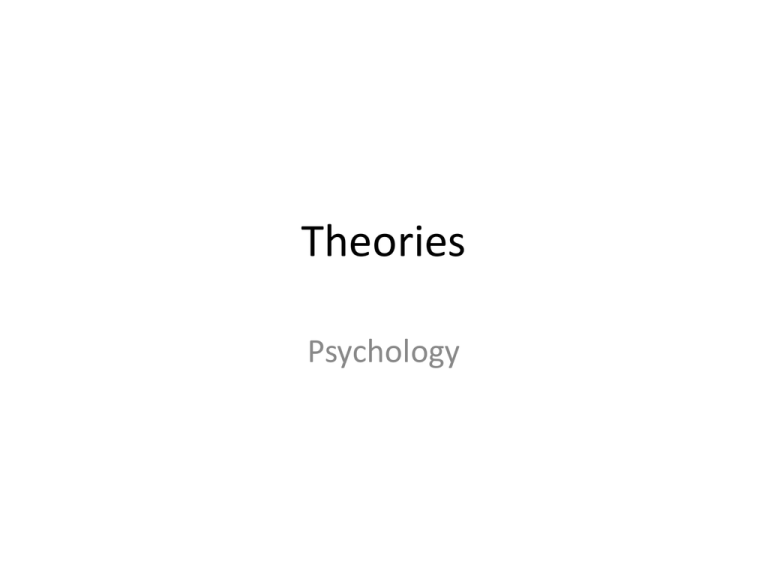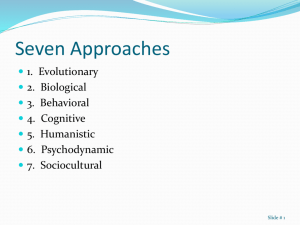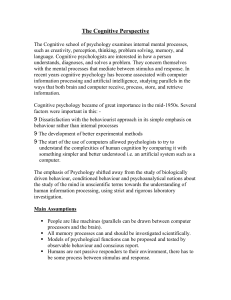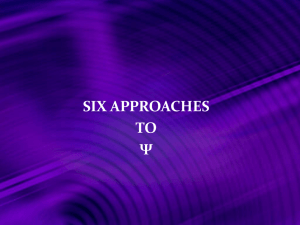File
advertisement

Theories Psychology Different Approaches to Psychology • • • • • • Biopsychiological Behavioural Psychoanalytic Humanistic Cognitive Sociocultural Biopsychological Approach • A field of psychology that deals with the effects of biological factors on behavior. Biopsychological Approach • Looks at the body to explain the mind -How much of your personality is inherited? -Is there a gene for suicide? -Does mental stress cause physical illness? • The nature side of the debate Biopsychological Approach • People react and feel certain ways because of the physical changes they go through • This approach gives psychology scientific credit Behavioural Approach • The idea that people’s behaviour is the product of learning and association Behavioural Approach • Think about all the people you have ever come into contact with… • This approach seeks to understand people by studying what happens to them and how they respond. Behavioural Approach • Concerned with the observable and measurable aspects of human behavior. • Life events can affect how people behave and respond • Contributes to a sociological aspect of psychology Behaviour Changing Responsible for behaviour modification , a process of shaping someone's behaviour by consistently rewarding the desired actions https://www.youtube.com/watch?v=Mt4N9GS BoMI Psychoanalytic Approach • A system that views the individual as a product of unconscious forces. • Views behaviour as driven by powerful mental conflicts locked deep within the subconscious. Psychoanalytic Approach • See psychological problems as rooted in the unconscious mind. • Typical causes include unresolved issues during development or repressed trauma. Psychoanalytical Approach • Treatment focuses on bringing the repressed conflict to consciousness, bringing “insight” • Psychology has an aspect of fascination. • Gives therapists a job to help people understand what they do not know about themselves. Humanistic Approach • The idea that people are naturally good, and if left to their own devices , they will strive to become the best they can be. • We are in control of our destinies and all of us can make our lives worth while. Humanistic Approach • People have a natural need for fulfillment, and an ultimate motivation to become “selfactualized” Humanistic Approach • To reach your full human potential, your most basic needs have to be met first. -You may not do as well on a test if you are hungry. You need to satisfy your physical need of hunger before you can succeed on the psychological demands of your school work. Humanistic Approach • Humanists encourage therapists to look at how people perceive their experiences—rather than focusing on the experiences themselves. • Psychology is there to help us feel comfortable with ourselves Cognitive Approach • The study of peoples ability to acquire, organize, remember, and use knowledge to guide behaviour. • We react to our environment, but we also solve problems, consider options and make decisions. Cognitive Approach • Revolves around the notion that if we want to know what makes people tick then we need to understand the internal processes of their mind Cognitive Approach • Our personalities are (to some extent) made up of the conversations that go on in you mind. • Cognitivists believe that we should learn to replace these sentences with useful ones and it will impact how you do things. Sociocultural Approach • Views behaviour as being strongly influenced by the rules and expectations of specific social groups and cultures. • Media, education, criminal justice system, family, friends etc.. Sociocultural Approach • We do what we do because we are influenced by specific ethnic, racial, and religious groups -Why do eating disorders only occur in countries like the united states? • All human beings have minds, but each culture produces a different vision. Sociocultural Approach • Our culture influences how we think, feel and act. • Psychological treatment will depend on your cultural background (individual vs groups) Psychological Theories • Each perspective offers valuable insights in to human nature and how we think and behave • Psychologists today value each unique contribution How would each theory look at alcoholism? Biopsychiological Behavioural Psychoanalytic Humanistic Cognitive Sociocultural Theory Studying Alcohol Abuse Biopsychological Is alcoholism a disease? What role does heredity play? How does alcohol affect the brain? Behaviourism Is alcoholism learned? Can it be unlearned? Can new habits replace drinking habits? Psychoanalysis Is heavy drinking an indication of some conflict raging in the unconscious? Does drinking allow unconscious desires to surface? Humanism Do people drink because they do not feel a sense of worth? Does alcohol provide false esteem? Cognitive What thoughts lead up to episodes of heavy drinking? If analyzed, can drinking patterns be changed? Sociocultural How does alcoholism differ among cultures? What societal pressures might cause alcohol abuse? Analysis Maria wants to ask for a raise, but becomes uncontrollably anxious every time she even gets near her boss. Biopsychiological Behavioural Psychoanalytic Humanistic Cognitive Sociocultural ??Using the six approaches we discussed, briefly describe how each might explain the simple behaviour?? Theory What Explains this Behaviour? Biopsychological Maria has little control over how her body reacts in this situation. A similar situation in the past probably caused an extreme reaction. What other physiological reactions is Maria experiencing besides anxiety? Behaviourism The environment has actually caused Maria to feel anxious. If her boss or other authority figures had awarded her in the past, she would now have little difficulty approaching her boss. Humanism Maria is potentially a good person, but she does not seem to realize this. With some encouragement from her boss, she might realize the inner strength she already possess. Psychoanalysis Marias uneasiness with her boss probably represents hidden anxiety towards someone else in her past. There is an unconscious effect that is making her nervous. Cognitive Maria is probably telling herself that she is inferior and that she does not deserve a raise. She should change her thinking. What thoughts about her boss make her anxious? Sociocultural In a culture with increased social media, Maria never learned how to have real conversations and has avoided talking to adults in a serious manner. What about YOU? • Think about YOU and how you see your world and how you make decisions. • Which of the Psychological Approaches do you feel most reflects why YOU do what YOU do? • Explain WHY, giving an example in your life as a teenager. Should be complete sentences.





